
Middle East Technical University is a public technical university located in Ankara, Turkey. The university puts special emphasis on research and education in engineering and natural sciences, offering about 40 undergraduate programs within 5 faculties, 97 masters and 62 doctorate programs within 5 graduate schools. The main campus of METU spans an area of 11,100 acres (4,500 ha), comprising, in addition to academic and auxiliary facilities, a forest area of 7,500 acres (3,000 ha), and the natural Lake Eymir. METU has more than 120,000 alumni worldwide. The official language of instruction at METU is English.
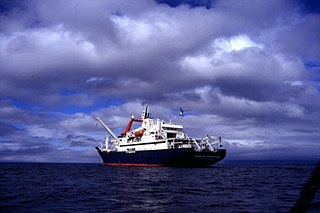
The Marion Dufresne II is a research and supply vessel named in honour of the 18th-century French explorer Marc-Joseph Marion du Fresne launched in 1995 and having two main missions: logistic support for the French Austral Islands and oceanographic research.

Mersin Province, formerly İçel Province, is a province in southern Turkey, on the Mediterranean coast between Antalya and Adana. The provincial capital and the biggest city in the province is Mersin, which is composed of Akdeniz, Mezitli, Toroslar and Yenişehir metropolitan municipalities, followed by Tarsus, the birthplace of Paul the Apostle. The province is considered to be a part of the geographical, economical and cultural region of Çukurova, which covers the provinces of Mersin, Adana, Osmaniye and Hatay.

CCGS Alfred Needler is an offshore fishery science vessel operated by the Canadian Coast Guard. The vessel entered service in 1982 with the Department of Fisheries and Oceans, stationed at the Bedford Institute of Oceanography in Dartmouth, Nova Scotia. In 1995, in order to reduce the number of ships and combine tasks, the Fisheries and Oceans fleet and the Canadian Coast Guard fleets were merged under the Canadian Coast Guard. Alfred Needler is currently in service.
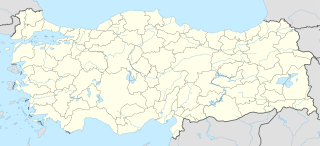
Erdemli is a town and district of Mersin Province in the Mediterranean region of Turkey, 35 km (22 mi) west of the city of Mersin.

USNS Relentless (T-AGOS-18) was a Stalwart-class modified tactical auxiliary general ocean surveillance ship in service in the United States Navy from 1990 to 1993. Since 1998, she has been in commission in the National Oceanic and Atmospheric Administration (NOAA) fleet as the fisheries research ship NOAAS Gordon Gunter.
HMCS Endeavour was an Endeavour-class oceanographic research ship. The vessel served the Royal Canadian Navy and later the Canadian Forces from 1965 to 1999. Endeavour performed research in oceanography and anti-submarine warfare, primarily on the West Coast of Canada.
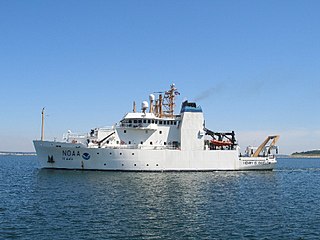
NOAAS Henry B. Bigelow is a fisheries research vessel operated by the United States' National Oceanic Atmospheric Administration (NOAA). She is the second in a class of five new fisheries research vessels. She is named after Henry Bryant Bigelow (1879-1967), the American oceanographer, zoologist, and marine biologist who founded the Woods Hole Oceanographic Institution in Woods Hole, Massachusetts.
Gulf of Mersin is one of the widest gulfs in Turkey. It is in the northeast of the Mediterranean Sea between the gulfs of İskenderun and Antalya.

A CTD or Sonde is an oceanography instrument used to measure the conductivity, temperature, and pressure of seawater. The reason to measure conductivity is that it can be used to determine the salinity.
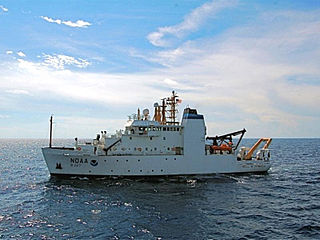
NOAAS Bell M. Shimada is an American fisheries research ship in commission with the National Oceanic and Atmospheric Administration (NOAA) since 2010. She operates along the United States West Coast.

NOAAS Reuben Lasker is a National Oceanic and Atmospheric Administration (NOAA) fishery research vessel. The ship's namesake, Reuben Lasker, was a fisheries biologist who served with the Southwest Fisheries Center, National Marine Fisheries Service, and taught at the Scripps Institution of Oceanography. This class of NOAA ships is very similar to, and based in part upon, the Neil Armstrong-class Oceanographic Research (AGOR) ships owned by the Office of Naval Research and operated by various US Universities.
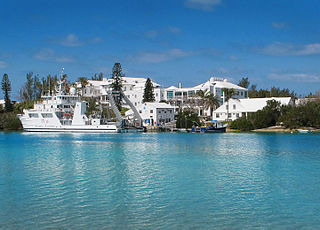
RV Atlantic Explorer is a twin-screw ocean vessel. It is owned and operated by the Bermuda Institute of Ocean Sciences (BIOS) in coordination with and as a part of the University-National Oceanographic Laboratory System (UNOLS) fleet. Atlantic Explorer is in compliance with US Coast Guard, UNOLS and American Bureau of Shipping (ABS) regulations as an uninspected oceanographic research vessel and is supported by the National Science Foundation (NSF). Its homeport is St. George's, Bermuda.
Fishery Oceanographic Research Vessel Sagar Sampada is an Indian research vessel that is equipped to carry out multidisciplinary research in oceanography, marine biology and fishery science. This is the unique facility of the country equipped to undertake oceanography and fisheries (demersal) in the same platform. The vessel is currently managed and operated by the Centre for Marine Living Resources & Ecology (CMLRE), Kochi, a research institute attached to the Ministry of Earth Sciences, Government of India, and is operated from Kochi. FORV Sagar Sampada is a platform for interdisciplinary expeditions in and around the Indian Exclusive Economic Zone, and in International waters with participation from various institutions, from India and abroad.
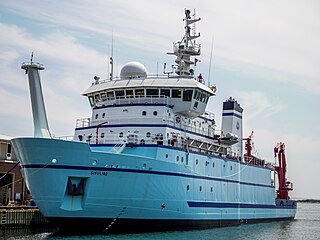
RVSikuliaq is an American research vessel owned by the National Science Foundation and operated by the University of Alaska Fairbanks College of Fisheries and Ocean Sciences. Built in 2014 by Marinette Marine Corporation in Marinette, Wisconsin, the $200 million vessel replaced the 1966-built research vessel Alpha Helix that was retired in 2007. Sikuliaq, named after the Iñupiaq word for "young sea ice" and pronounced "see-KOO-lee-auk", will be homeported in Seward, Alaska.

R/V Ocean Starr is an American research vessel. She was in the United States Fish and Wildlife Service's Bureau of Commercial Fisheries fleet from 1966 to 1970 as BCF David Starr Jordan. The ship later served under the National Oceanic and Atmospheric Administration (NOAA) from 1970 to 2010.
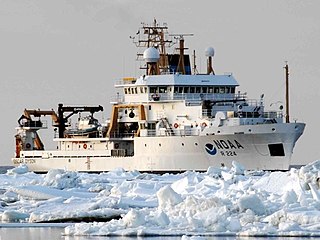
NOAAS Oscar Dyson is an American fisheries and oceanographic research vessel in commission in the National Oceanic and Atmospheric Administration (NOAA) fleet since 2005.

NOAAS Pisces is an American fisheries and oceanographic research vessel in commission in the National Oceanic and Atmospheric Administration (NOAA) fleet since 2009.

The RV Bilim-2 is a Turkish research vessel owned by the Middle East Technical University in Ankara and operated in deep waters by its Institute of Marine Sciences based in Erdemli, Mersin, Turkey.
Alata Research Institute of Horticulture is a research institute for horticulture in Mersin Province, Turkey.

















